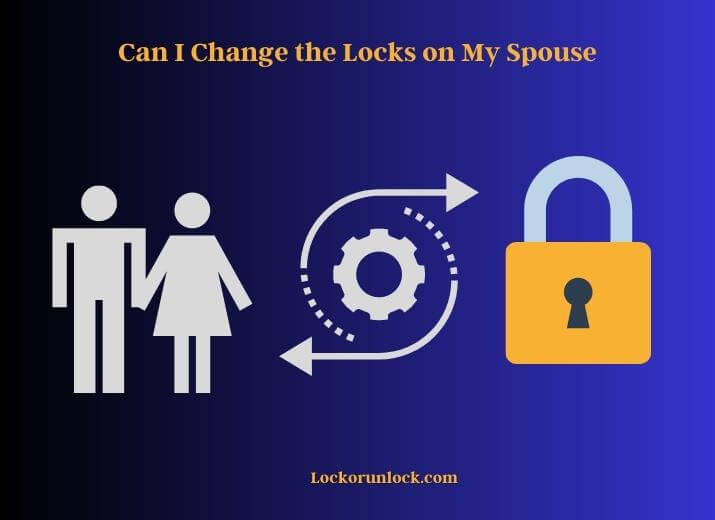Marriage is a complex and challenging relationship that requires effort and commitment from both partners. Even the most committed couples can experience difficulties that can lead to a breakdown in their relationship. In some cases, one partner may feel the need to take drastic action, such as changing the locks on their spouse. While this may seem like a viable solution to protect oneself or one’s property, it’s essential to understand that this action can have serious legal and safety implications.

Changing the locks on a spouse without their consent is not only a violation of their property rights but can also lead to legal charges such as domestic violence or violation of court orders. Moreover, it can escalate the situation and pose a threat to the safety of both parties. Therefore, it’s important to seek professional help and guidance before making any decisions related to marital property rights and changing locks on a spouse.
What You Should Know Before Changing the Locks?
Changing the locks on your spouse without their consent is a serious decision that can have legal and safety implications.
Legal Implications
As we mentioned earlier, changing the locks without your spouse’s consent can be seen as a violation of their property rights. It’s essential to understand your state’s laws regarding marital property rights and ownership. If there are any legal orders such as restraining orders or court orders in place, changing the locks could result in charges of domestic violence or violation of court orders.
Alternative Solutions
Changing the locks should be a last resort. It’s important to explore other solutions such as counseling or mediation to address any underlying issues and work towards resolving them. If these options are not feasible, legal separation or divorce may be a more appropriate solution.
Safety Considerations
Changing the locks without your spouse’s knowledge or consent can escalate the situation and pose a threat to the safety of both parties. Your spouse may feel angry, frustrated, or even retaliatory. Therefore, it’s important to seek professional help and support from law enforcement, legal counsel, or domestic violence shelters before making any decisions.
Communication
It’s important to communicate with your spouse before making any decisions regarding changing the locks. If possible, try to have an open and honest conversation about your concerns and explore alternative solutions together. If communication is difficult, seeking the help of a professional mediator or therapist can be helpful.
Reasons for Changing the Locks on Your Spouse
While changing the locks on a spouse without their consent is generally not recommended, there may be some situations where it’s necessary to consider this option.
Safety Concerns
If your spouse has a history of violence, abuse, or threatening behavior, changing the locks can be a necessary step to protect yourself and your children. In these cases, it’s essential to seek professional help and support from law enforcement, legal counsel, or domestic violence shelters before making any decisions.
Infidelity
If you suspect that your spouse is cheating, changing the locks may seem like a natural response to prevent them from entering the home or accessing any shared property. It’s important to note that changing the locks without your spouse’s consent is generally not legal, and alternative solutions such as separation or divorce may be more appropriate.
Separation
If you and your spouse have agreed to separate, changing the locks can provide a sense of security and privacy during the separation process. Communicate with your spouse about the decision and seek legal guidance to ensure that you are not violating any property rights or legal orders.
Financial Concerns
In some cases, one spouse may be concerned about their spouse taking property or assets without their consent. In these cases, changing the locks can provide a sense of control and prevent unauthorized access to shared property. However, it’s important to explore alternative solutions such as mediation or legal separation before taking any action.
How to Change the Locks on Your Spouse?
It’s important to understand that changing the locks on your spouse without their consent is generally not legal, and there may be serious legal and safety implications. If you have explored alternative solutions and have sought professional guidance, and it’s determined that changing the locks is necessary, here are some steps to follow:

| Hire a professional locksmith | It’s important to hire a professional locksmith to ensure that the locks are changed correctly and that there are no issues with the installation. The locksmith will be able to provide guidance on the best type of lock for your needs and ensure that the new lock is secure. |
| Notify your spouse | Before changing the locks, it’s important to notify your spouse of your intentions. While this may be difficult, it’s essential to be transparent about your actions and communicate the reasons for your decision. This can help to prevent any misunderstandings or potential legal issues down the line. |
| Provide a copy of the new key | If you change the locks, you should provide your spouse with a copy of the new key. This can help to prevent any potential legal issues and ensure that they are still able to access any shared property or assets. |
| Seek legal guidance | Before taking any action related to changing the locks on your spouse, it’s essential to seek legal guidance. A family law attorney can provide guidance on the legal implications of changing the locks and ensure that you are not violating any property rights or legal orders. |
What to Do After Changing the Locks?
After changing the locks on your spouse, there are several important steps you should take. First and foremost, ensure that you and any children involved are safe and secure. If you have changed the locks due to safety concerns or domestic violence, consider seeking help from a local domestic violence shelter or hotline. They can provide you with resources and support to help you through this difficult time.
It’s also important to communicate with your spouse about the changes you have made. If possible, do so through a neutral third party or via email or text message. Let them know why you felt it was necessary to change the locks and what steps they can take to regain access to the property if appropriate. If there are legal or financial implications of changing the locks, consider seeking guidance from a family law attorney.
Be prepared for potential emotional fallout from your spouse. They may feel hurt, angry, or betrayed by your decision to change the locks, and it’s important to be patient and understanding as they work through their feelings. If possible, consider seeking counseling or therapy together to help you communicate and work towards a solution that works for both parties. Remember that changing the locks is a serious decision that can have significant legal and emotional consequences, and should only be taken in extreme circumstances.
How to Deal with a Spouse Who Has Changed the Locks?
Discovering that your spouse has changed the locks can be a confusing and distressing situation.
Communicate
It’s important to communicate with your spouse and find out why they have changed the locks. Ask for an explanation and try to understand their perspective. Communication can help to prevent misunderstandings and find solutions that work for both parties.
Seek Legal Guidance
If you are concerned that your spouse has violated any legal requirements or orders related to property or asset division, it’s important to seek legal guidance from a family law attorney. They can provide advice on your legal rights and help you to navigate the situation.
Respect Their Decision
If your spouse has changed the locks due to safety concerns or other serious issues, it’s important to respect their decision and take steps to address any underlying problems. Seek counseling or professional help if needed.
Seek a Temporary Order
If you need access to the property or assets, it may be necessary to seek a temporary order from the court. This can help to ensure that you have access to the property or assets until a permanent solution is reached.
Mediation
Mediation can be an effective way to resolve conflicts and find solutions that work for both parties. A mediator can help to facilitate communication and find common ground between you and your spouse.
Final Thoughts
Changing the locks on your spouse is a serious decision that should only be taken in extreme circumstances. Before taking any action, it’s important to carefully consider the reasons why you are considering changing the locks and explore alternative solutions. Communication, counseling, separation agreements, restraining orders, and mediation can all be effective alternatives to changing the locks.
If you are dealing with a spouse who has changed the locks, it’s important to approach the situation with patience and understanding. Communication, seeking legal guidance, respecting their decision, seeking a temporary order, and mediation can all be effective ways to deal with the situation.
The decision to change the locks on your spouse or deal with a spouse who has changed the locks is a complex and emotionally charged issue. It’s important to seek professional guidance as needed and take steps to protect yourself and any children involved. By approaching the situation with care and consideration, you can find a solution that works for both parties and move forward in a positive and healthy way.
